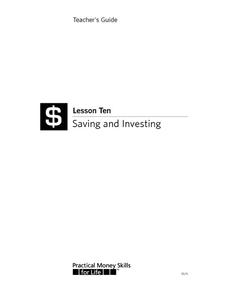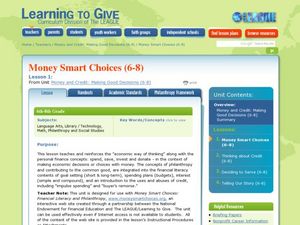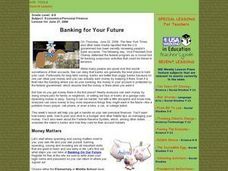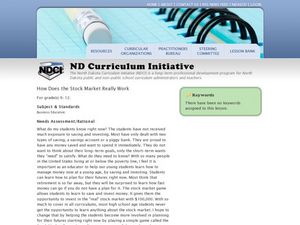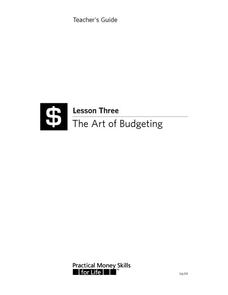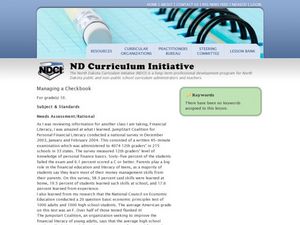Federal Reserve Bank
Saving and Investing for the Long Term
Create savvy investors with an activity that uses an online resource to allow individuals to invest in the stock market. The teacher is able to track activity and progress. Stock tips and strategies are shared.
Visa
Saving and Investing
Impress upon your young adults the importance of saving and investing, and give them a foundational vocabulary from which they can continue to build their financial literacy. This lesson plan covers short- and long-term budget goals,...
Visa
Make It Happen: Saving for a Rainy Day
Every little penny counts, especially when it comes to saving for emergencies or long-term goals. Pupils evaluate different saving and investment strategies, such as a CD or money market account, through worksheets and by researching...
Practical Money Skills
Saving and Investing
Learn the difference between saving money and investing money, as well as the advantages and disadvantages of each. Kids review banking and personal finance terms before studying the different ways that people can reach their financial...
Cengage Learning
Economics and Personal Finance
You don't have to be an economist to understand this packet packed with information and exercises about economics and personal finance. Designed for high schoolers, the activities explain why setting short and long terms goals is...
Visa
A Way to Wealth: Understanding Interest and Investments
Money motivates! Help young bankers understand how math plays a part in investing. Give learners math practice while instilling real-world financial literacy skills.
Rainforest Alliance
Investments in Forest Carbon
One hundred metric tons of CO2 can accumulate in one acre of forest over time—that's a lot of carbon! In the activity, groups of middle school learners determine what makes forests important. They then solidify the concept by using a...
PwC Financial Literacy
Planning and Money Management: Spending and Saving
Financial literacy is such an important, and often-overlooked, skill to teach our young people. Here is a terrific lesson which has pupils explore how to come up with a personal budget. They consider income, saving, taxes, and their...
Curated OER
What Can You Do With Money?
Students watch a Biz Kidz video about money, learn what they can do with money, and fill out worksheets on what they learn. Students learn about spending, saving, donating, and investing.
Visa
Dream Big: Money and Goals
Whether their objective is independent living, going to college, or buying a car, pupils will participate in discussions and complete worksheets to gain an understanding of how short- and long-term goals play a large role in helping...
Council for Economic Education
Loan Amortization - Mortgage
When you buy a home for $100,000, you pay $100,000—right? On the list of important things for individuals to understand, the lesson presents the concept of interest rates and loan amortization using spreadsheets and online sources....
Curated OER
Understanding Risk And Return
Students engage in a lesson introducing them to the concept of Risk and Return. Risk and return is a basic principle that should be understood before investing money. They utilize an interactive worksheet imbedded in this plan.
Curated OER
Money and Credit: Making Good Decisions
Middle schoolers participate in activities that teach them how to manage money. In this managing money lesson plan, students set long and short term goals for economic success by having discussions, identifying benefits of saving, and...
Curated OER
Banking for Your Future
Students get a handle on their own personal finances. They discover how banks work, how to plan and stick to a budget, and other helpful tips on managing money. They study the Federal Reserve System, which oversees the nation's banks.
Curated OER
Reading Comprehension 6: Level 12
Although designed as an assessment, consider using this resource as the basis for a lesson on reading comprehension strategies or as a practice exercise. The five multiple choice questions, based on a short passage about stock market...
Curated OER
Money Smart Teens
Students plan positive goals for spending resources and understand why not to spend. In this financial planning activity, students set up personal spending plans based on their resources and their long term plans. Students plan for...
Curated OER
Doubling Your Money
Your young financial geniuses explore the Rule of 70 as they analyze the exponential function that models the doubling time of investments.
Curated OER
Saving For Retirement
Students examine the fundamentals related to saving for retirement and investing such as return on investment, compound interest, and planning for different rates of savings. They see the importance of setting long term saving goals.
Curated OER
Impact of Inventors
Young scholars examine the impact of inventors on our world. For this science lesson, students are given a time line of the invention of familiar objects. Young scholars then evaluate some kid inventors and decide if they would make...
Federal Reserve Bank
Wait, Is Saving Good or Bad? The Paradox of Thrift
Could saving really harm the economy? Discover the paradox of thrift and how decreases in consumption can affect economic recovery and various markets and industries.
Curated OER
How Does the Stock Market Really Work?
Investigate the stock market as it relates to the business world. Young scholars investigate ways to invest their money for the future. They make a presentation and discuss their findings with the class.
Visa
The Art of Budgeting
Class members learn how to set up and maintain a personal budget through discussion, financial planning worksheets, and a brief PowerPoint presentation.
Curated OER
Managing a Checkbook
How do grown ups do it? Teach your upper graders the ins and outs of personal finance by having them use their algebra skills to balance a checkbook. They examine the financial side of math, set up a checking account, and balance their...
Curated OER
Economics Concepts
Learners relate economics and government policies. In this lesson, students explore the relationship between economics and government policies. They understand how the economy works and can make better decisions as it relates to the future.



